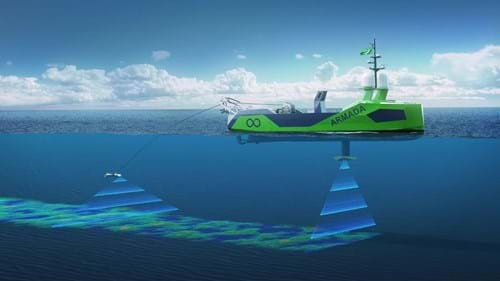Published: 10/03/2021
To mark British Science Week, we’ve put together an overview of how science and technology is driving the solutions for the shipping of the future, with a look at real life autonomous shipping projects.
Steeped in tradition, the maritime sector is now undergoing a ‘sea change’. It’s part of the global aim to reduce carbon emissions, decarbonize shipping and harness the opportunities stemming from rapid advances in technology.
It’s the role of the Maritime and Coastguard Agency’s (MCA) Maritime Future Technologies (MFT) team to work collaboratively with industry and academia to take the lead with unbiased technical direction, based on science. The aim is to support the industry through trials and projects, support regulatory changes and drive forward innovative technology in emission reduction and autonomy.
Autonomous shipping – rapid developments
Smart and autonomous shipping industries have been developing rapidly in recent years. It became clear that the smart and autonomous shipping industries were developing faster than the regulations could keep up with.
The danger of stifling innovation because the rules could not allow for it was huge and the UK stepped up with MARLab, a million-pound project which established ways to allow the testing and safe operation of remotely operated vessels under 24m long.
The project concluded in 2020 and now the MCA is continuing to build on that success by facilitating live, ground-breaking projects in the UK.
Projects overview
Armada: Ocean Infinity has launched a pioneering new marine technology and data company, Armada. It will add fifteen bespoke designed marine robots which are equipped for off shore data acquisition and intervention operations to a depth of 6,000 metres.
The MFT team has provided regulatory and technical guidance for these ‘robot’ ships which require neither people on board nor a host vessel nearby and the fleet approach means that up to 90% less CO2 will be produced compared with conventional survey vessels. They will be remotely controlled by experienced mariners from state of the art facilities in Southampton and Texas USA.
Crew Transfer Vessels: A current live project is for a vessel design to transport crews to and from the increasing number of offshore windfarms. The MFT team is working with the operator to ensure safety is at the heart of the design for the vessel which uses diesel/hydrogen hybrid technologies which save 1.9 tonnes of CO2 per day.
UK’s First Electric Ferry: Opting to work with the MCA for future projects, Plymouth Boat Trips and Voyager Marine have launched the UK’s first electric sea going ferry, the e-Voyager. It’s the first vessel to be recognised by both the MCA and a Classification Society as meeting the exacting safety standards and paves the way for larger scale innovation to meet emissions reduction targets.
Mayflower Autonomous Ship: This is a project that updates the history books with today’s technology being used to reflect the voyage taken 400 years ago when the original Mayflower left Plymouth for America. It’s now the world’s first full sized, fully autonomous ship (no crew needed), over 100ft long, powered by state-of-the-art wind and solar power technology. It’s due to set sail on 19 April 2021.
The MCA played a focal role in co-ordinating the policy leads and directorates to help facilitate the project and led the regulatory response process for the novel technology aspects.
Other related articles:
- MCA drives forward world-leading smart shipping innovation
- MASS People
- International Day of Women and Girls in Science
- The full MARLab report can be found here

Credit images: Ocean Infinity